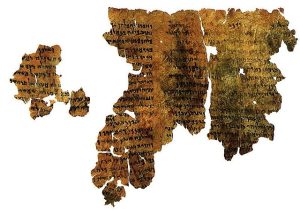Mysticism and Magic
Jews have always striven to gain greater access to the realm of the divine. When these attempts have an experiential element, they are referred to as mystical. The texts found at Qumran are more descriptive than experiential, yet they laid the groundwork for later mystical texts and were influential in the development of Jewish mysticism.
Magic, as opposed to mysticism, is intended to elicit God’s help in warding off evil. Despite being significantly different from mysticism, both in Qumran and in later Jewish texts we find considerable interaction between these two phenomena.
Before the discovery of the Dead Sea Scrolls, most scholars assumed that the source of Jewish mysticism was an outside influence, such as Gnosticism, Zoroastrianism or Hellenism. However, it is now evident that mystical phenomena appear in ancient biblical traditions and in Second Temple sources, including the Dead Sea Scrolls. Foreign traditions may have interacted with Jewish mysticism, but its origins are clearly in the inner workings of Judaism itself.
See also:
Primary Sources
What do you want to know?
Ask our AI widget and get answers from this website
